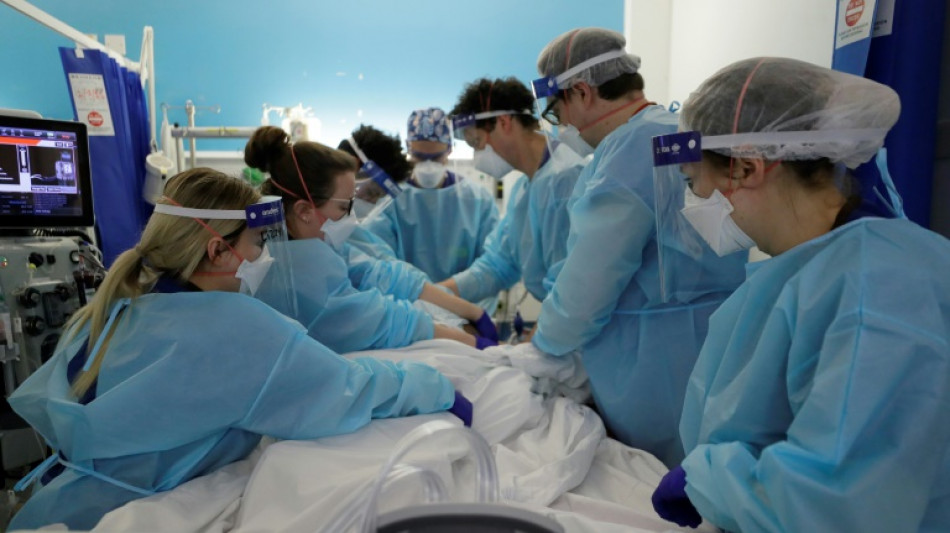
-
 Guirassy extends streak as Dortmund cruise past 10-man Heidenheim
Guirassy extends streak as Dortmund cruise past 10-man Heidenheim
-
Vingegaard touching Vuelta glory with stage 20 triumph as protests continue

-
 'World's fastest anime fan' Lyles in element at Tokyo worlds
'World's fastest anime fan' Lyles in element at Tokyo worlds
-
De Minaur's Australia trail as Germany, Argentina into Davis Cup finals

-
 Airstrikes, drones, tariffs: being US friend not what it used to be
Airstrikes, drones, tariffs: being US friend not what it used to be
-
Cyclists swerve protest group in road during Vuelta stage 20

-
 A Tokyo full house revels in Chebet and sprinters at world athletics champs
A Tokyo full house revels in Chebet and sprinters at world athletics champs
-
Holders New Zealand fight past South Africa into Women's Rugby World Cup semis

-
 Ex-Olympic champion Rissveds overcomes depression to win world mountain bike gold
Ex-Olympic champion Rissveds overcomes depression to win world mountain bike gold
-
Kenya's Chebet wins 10,000m gold, suggests no tilt at world double

-
 Arsenal ruin Postecoglou's Forest debut as Zubimendi bags brace
Arsenal ruin Postecoglou's Forest debut as Zubimendi bags brace
-
Shot put legend Crouser wins third successive world title

-
 Bezzecchi wins San Marino MotoGP sprint as Marc Marquez crashes out
Bezzecchi wins San Marino MotoGP sprint as Marc Marquez crashes out
-
Kenya's Chebet wins 10,000m gold to set up tilt at world double

-
 Lyles, Thompson and Tebogo cruise through world 100m heats
Lyles, Thompson and Tebogo cruise through world 100m heats
-
Vuelta final stage shortened amid protest fears

-
 Collignon stuns De Minaur as Belgium take Davis Cup lead over Australia
Collignon stuns De Minaur as Belgium take Davis Cup lead over Australia
-
Nepal returns to calm as first woman PM takes charge, visits wounded

-
 Olympic champion Alfred eases through 100m heats at Tokyo worlds
Olympic champion Alfred eases through 100m heats at Tokyo worlds
-
Winning coach Erasmus 'emotional' at death of former Springboks

-
 Barca's Flick blasts Spain over Yamal injury issue
Barca's Flick blasts Spain over Yamal injury issue
-
Rampant Springboks inflict record 43-10 defeat to humble All Blacks

-
 Italy's Bezzecchi claims San Marino MotoGP pole as Marquez brothers denied
Italy's Bezzecchi claims San Marino MotoGP pole as Marquez brothers denied
-
Rampant South Africa inflict record 43-10 defeat on All Blacks

-
 Collignon stuns De Minaur as Belgium take 2-0 Davis Cup lead over Australia
Collignon stuns De Minaur as Belgium take 2-0 Davis Cup lead over Australia
-
Mourning Nepalis hope protest deaths will bring change
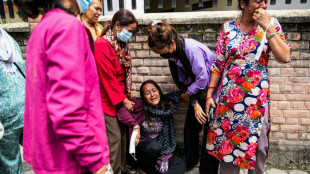
-
 Carreras boots Argentina to nervy 28-26 win over Australia
Carreras boots Argentina to nervy 28-26 win over Australia
-
Nepal returns to calm as first woman PM takes charge

-
 How mowing less lets flowers bloom along Austria's 'Green Belt'
How mowing less lets flowers bloom along Austria's 'Green Belt'
-
Too hot to study, say Italian teachers as school (finally) resumes

-
 Alvarez, Crawford both scale 167.5 pounds for blockbuster bout
Alvarez, Crawford both scale 167.5 pounds for blockbuster bout
-
Tokyo fans savour athletics worlds four years after Olympic lockout

-
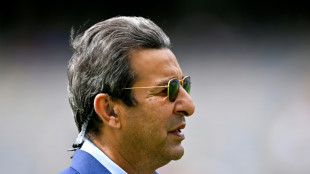 Akram tells Pakistan, India to forget noise and 'enjoy' Asia Cup clash
Akram tells Pakistan, India to forget noise and 'enjoy' Asia Cup clash
-
Kicillof, the Argentine governor on a mission to stop Milei

-
 Something to get your teeth into: 'Jaws' exhibit marks 50 years
Something to get your teeth into: 'Jaws' exhibit marks 50 years
-
Germany, France, Argentina, Austria on brink of Davis Cup finals

-
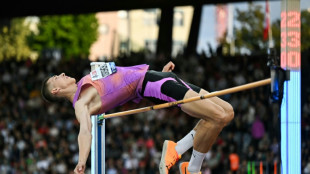 War with Russia weighs heavily on Ukrainian medal hope Doroshchuk
War with Russia weighs heavily on Ukrainian medal hope Doroshchuk
-
Suspect in Charlie Kirk killing caught, widow vows to carry on fight

-
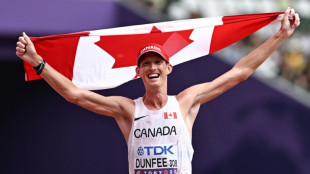 Dunfee and Perez claim opening world golds in Tokyo
Dunfee and Perez claim opening world golds in Tokyo
-
Ben Griffin leads PGA Procore Championship in Ryder Cup tune-up

-
 'We're more than our pain': Miss Palestine to compete on global stage
'We're more than our pain': Miss Palestine to compete on global stage
-
Ingebrigtsen seeks elusive 1500m world gold after injury-plagued season

-
 Thailand's Chanettee leads by two at LPGA Queen City event
Thailand's Chanettee leads by two at LPGA Queen City event
-
Dolphins' Hill says focus is on football amid domestic violence allegations

-
 Nigerian chef aims for rice hotpot record
Nigerian chef aims for rice hotpot record
-
What next for Brazil after Bolsonaro's conviction?
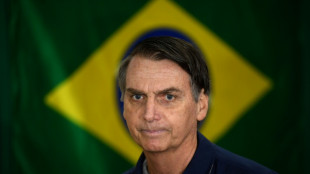
-
 Fitch downgrades France's credit rating in new debt battle blow
Fitch downgrades France's credit rating in new debt battle blow
-
Fifty reported dead in Gaza as Israel steps up attacks on main city

-
 Greenwood among scorers as Marseille cruise to four-goal victory
Greenwood among scorers as Marseille cruise to four-goal victory
-
Rodgers calls out 'cowardly' leak amid Celtic civil war


From nightmares to PTSD: Covid stokes UK health care staff crisis
Long shifts working in intensive care and the risk of catching Covid and passing it on to his wife and children left Joan Pons Laplana exhausted.
"By the end of the second wave I was all over the place. I had nightmares, panic attacks. I started having suicidal thoughts, mood swings," he told AFP.
"My personal life was falling apart."
Laplana, a 46-year-old Catalan who lives in Chesterfield, northern England, had suffered burnout even before the global health crisis hit.
But the intense work pressure saw him diagnosed with post-traumatic stress disorder, and forced him to quit as a nurse to protect his mental health -- joining tens of thousands of health workers who have resigned during the pandemic.
"I saw a patient my age with a daughter my daughter's age," he said, recalling how the girl said goodbye over an electronic tablet moments before her father passed away.
"I started having nightmare seeing the eyes of the dad."
Laplana is not alone.
In 2020, as Europe battled soaring cases of Covid, alarm bells were already being sounded about the emotional and psychological impact of the pandemic on frontline medics.
In Britain, the relentless pressure has led to an exodus of staff: some 33,000 workers quit the state-run National Health Service (NHS) in the third quarter last year.
That was almost double compared with the final quarter of 2019, just before coronavirus arrived in Britain.
According to official statistics, nearly 7,000 of those who resigned in the third quarter of 2021 said they wanted a better work-life balance.
- Long shifts -
Akshay Akulwar has not yet resigned but has thought about relocating abroad -- to New Zealand or Australia where salaries are higher -- or to his home country India.
The surgeon, who works in eastern England and is a spokesman at the Doctors' Association UK, said the long hours affect well-being, personal and family life.
The pandemic has seen him on call, work night shifts and do more hours than ever before, he said.
"Slowly and gradually you feel burnout, you start to work less effectively. You cannot go on at this elevated level of activity for so long, " he said.
Public sector union Unison said more than two-thirds of medical staff have suffered burnout during the pandemic, and more than half worked beyond their contractual hours.
As a result, more than half of the sector's employees are looking for a new job, deepening recruitment problems caused by retirement, Brexit and new immigration rules.
Unison's head of health, Sara Gorton, said staff had been "wrung dry by pandemic pressures" as they cover for sick colleagues and feel guilty about not providing quality care.
"The NHS was already more than 100,000 staff short before coronavirus. The pandemic has upped the strain on health employees, and many have had enough," she added.
Staff shortages caused by the rapid spread of the Omicron variant of coronavirus saw soldiers drafted in to help in British hospitals and ambulance services.
Bill Palmer, from the Nuffield Trust health sector think-tank, said NHS staff felt a "professional obligation" to stay on after the first year of the pandemic.
Between 2016 and the start of the outbreak, there had been a growing trend towards staff quitting their posts. Now after a pause, resignations are rising again, he added.
- 'Like a number' -
How to plug the gaps of staff departures in the NHS is a pressing problem for the government, with the pandemic having caused a huge backlog in treatment and surgeries.
The Nursing and Midwifery Council has said that last year there were some 8,000 fewer nurses from European Economic Area nations than in 2016.
More than half of EU nurses leaving Britain cited the country's departure from the bloc as a reason for their decision.
Getting medical and social care staff from further afield is also problematic, with tighter post-Brexit immigration rules also proving a block on recruitment.
Higher salaries in other sectors are proving a draw for lower-paid, non-medical NHS staff.
Alex, who declined to give his full name, said he quit his job as a community mental health nurse in northwest England because he felt "treated like a number and not like an individual".
His workload increased by 25 percent but the additional responsibilities did not see his pay increase, affecting his own mental health.
He now works for with victims of modern slavery and domestic violence.
"I have similar pay but less stress, less workload," he said. "I feel supported."
K.Brown--BTB

